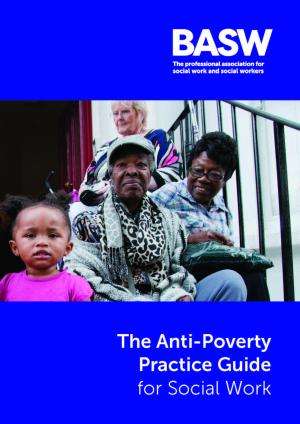BASW launches Anti-Poverty Practice Guide for Social Work

Published by Professional Social Work, September 5
A guide that urges social workers to recognise and challenge the harmful effects of poverty on people’s lives was launched by BASW.
The Anti-Poverty Practice Guide for Social Work aims to shape practice and policy as well as encouraging practitioners to consider the impact of deprivation in assessments and decision-making.
It comes on the back of campaigning by BASW against austerity including the 2017 Boot Out Austerity walk, launch of the Austerity Action Group and creation of a Campaign Action Pack against austerity.
Speaking at the launch, BASW chair Gerry Nosowska said: “Our code of ethics says social work is based on respect, equality, dignity and the worth of all people. If poverty undermines dignity, then we can’t be social workers without trying to tackle it.
“It is important to see the words poverty and social work together. This is core business for social work.”
Nosowska added: “At the moment we are living through a time where there is a myth about the individual, that what happens to them and the troubles they face is all located within them.
“However, there is a growing consensus that it is morally right to work against poverty – people are becoming outraged about things like foodbanks.
“This country is quite well off so we don’t need to have poverty here – we can change it if we want to.”
The UK-wide guide was created together with the Child Welfare Inequalities Project (CWIP) – a university research collaboration – and ATD Fourth World, which advocates for people with lived experience of poverty.
Godfred Boahen, policy and research officer for BASW who led on the project, said political consensus of the state’s role in eliminating poverty had waned, particularly since the 2008 economic crash.
“You only have to think of some of the work around universal credit. Some policies seem designed to increase poverty and deprivation.
“BASW social workers were concerned about the poverty they witnessed at the level of families: the increased number of children being looked after; self-medicating and using alcohol and other drugs; an increase in mental illness. They wanted to take collective action against poverty.”
Boahen said the role of social workers in supporting individuals was important but it was “only one part of the picture”.
“There are issues around systems and how organisations are set up and questions around social policy and the impact of government policies on poverty.”
CWIP member Professor Kate Morris, of Sheffield University, praised BASW for creating the guide.
She said: “Poverty isn’t getting talked about because it is the wallpaper of practice. It is unremarkable and unremarked upon.
“When you ask social workers about poverty and child neglect, when we look at child protection plans there is rarely mention of the socioeconomic determinants of harm. Social workers have got themselves into a moral muddle where talking about poverty is seen as stigmatising, but it is actually denying the reality of families’ everyday lives.
“We need to be confident about having those conversations.”
Prof Morris highlighted research commissioned by the Nuffield Foundation showing a child in the most deprived localities is 11 times more likely to be on a protection plan and 12 times more likely to be looked after than a child in the most affluent localities.
Tom Croft, from ATD Fourth World, said this was a big issue for people with lived experience.
“The problem was there already but austerity has made things much worse. It is a structural problem.”
Parent activists spoke of what they wanted from social workers. Laura Mason said: “Treat us with respect as an equal and don’t look down upon us.”
She described an act of compassion from her social worker and the difference it made during a time of trauma.
“She put her hand on my shoulder as tears were rolling down my eyes. That contact changed our whole relationship and everything that came after.”
She also recalled bumping into a social worker who had left to start a family who talked about the challenges of raising children. “She said ‘I know now how hard it is without money’.”
Eric Nibbs said parents in poverty had to make difficult choices: “Do I eat or put shoes on my child’s feet?” he said. “Nine times out of ten you don’t eat. A lot of social workers don’t realise how much sacrifice a parent makes on a daily basis because they don’t see it and they don’t live it. Talk with us, not at us. That is one thing we do beg.”
ADT senior family support worker Shaeda Croft urged social workers not to include hurtful judgements when writing assessments about people living in poverty.
“Words like ‘shabbily dressed’ and ‘grubby’ really hurt and stay with service users. They are worried that is how they are viewed and what their kids are going to read in reports about them. You have to be really careful how these reports are written about people living in poverty who are trying their best.”
BASW chief executive Ruth Allen hoped the guide would help social workers “take action within their practice”.
She said: “Our aim is that this changes people’s thinking, it changes their practice. It gives a sense of being part of a movement to expose and then do something about the levels of poverty and deprivation we know people are experiencing and ensure social work is part of the solution, not part of the problem.”
Allen stressed working in partnership with people who had lived experience of poverty was “a crucial part of our work”.
She added: “This is about us – we are all us, we are not us and them.”
This article is published by Professional Social work magazine which provides a platform for a range of perspectives across the social work sector. It does not necessarily reflect the views of the British Association of Social Workers.
